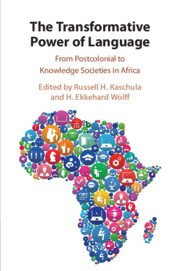Book contents
- The Transformative Power of Language
- The Transformative Power of Language
- Copyright page
- Contents
- Figures
- Tables
- Contributors
- Preface
- Abbreviations and Acronyms
- Introduction
- Part I Mental Decolonisation and Cultural Diversity
- 1 The Role of African Languages in Decolonising South African Universities
- 2 Adapt or Die
- 3 Decolonising Our Minds, Decolonising Our Languages
- Part II Multilingualism and Intellectualisation of African Languages
- Part III Digitalisation and Democratisation of Knowledge
- Part IV Interlingual and Intercultural Cross-Fertilisation
- Index
- References
2 - Adapt or Die
Maintaining or Decolonising Language Practices?
from Part I - Mental Decolonisation and Cultural Diversity
Published online by Cambridge University Press: 18 September 2020
- The Transformative Power of Language
- The Transformative Power of Language
- Copyright page
- Contents
- Figures
- Tables
- Contributors
- Preface
- Abbreviations and Acronyms
- Introduction
- Part I Mental Decolonisation and Cultural Diversity
- 1 The Role of African Languages in Decolonising South African Universities
- 2 Adapt or Die
- 3 Decolonising Our Minds, Decolonising Our Languages
- Part II Multilingualism and Intellectualisation of African Languages
- Part III Digitalisation and Democratisation of Knowledge
- Part IV Interlingual and Intercultural Cross-Fertilisation
- Index
- References
Summary
This chapter draws attention to the Afrocentric linguistic and literacy practices of English-additional-language students in the department mechanical engineering at the Cape Peninsula University of Technology in reclaiming their rightful voice in recuperating the curriculum in the process of decolonisation. As part of a broader study, the author created a multimodal intervention for the students who were struggling to gain access to their discipline-specific language. The chapter reports on their elicited experiences in making sense of the curriculum by using these multimodal resources. From a theoretical perspective, the chapter draws on Hornberger’s continua of biliteracy model to provide us with a lens to discuss the responses and language practices of the participants. Questionnaires, focus group interviews and various excerpts gathered from texts produced by English-as-additional language students provided the data for the study. The findings point to dehegemonising practices and the restructuring of knowledge that recognises Afrocentric literacies and cultures.
Keywords
Information
- Type
- Chapter
- Information
- The Transformative Power of LanguageFrom Postcolonial to Knowledge Societies in Africa, pp. 43 - 66Publisher: Cambridge University PressPrint publication year: 2020
References
Accessibility standard: Unknown
Why this information is here
This section outlines the accessibility features of this content - including support for screen readers, full keyboard navigation and high-contrast display options. This may not be relevant for you.Accessibility Information
- 1
- Cited by
